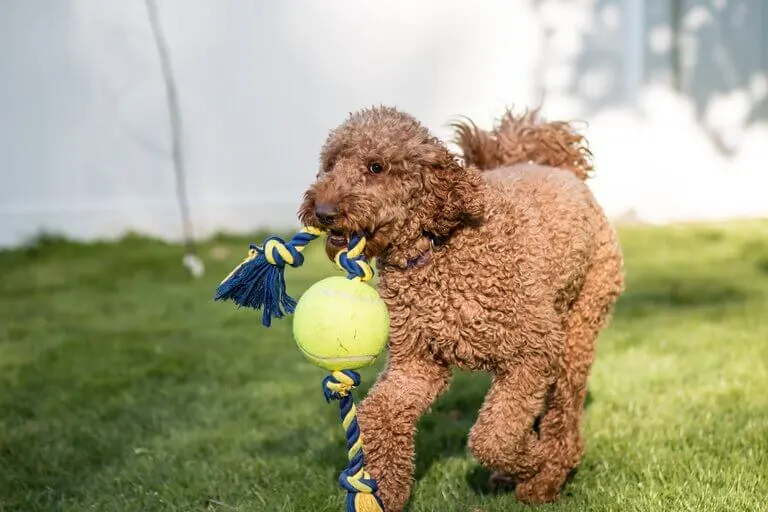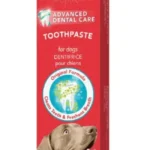Did you know Labradoodles were first bred in Australia to be hypoallergenic guide dogs? These adorable mixtures of Labrador Retrievers and Poodles quickly stole hearts, emerging as one of the most popular family pets today. Both intelligent and playful, Labradoodles inherit the finest qualities from their diverse lineage. They showcase the lovable nature of Labradors and the hypoallergenic coat of Poodles. Given their unique blend, finding the best dog food for Labradoodles is essential. Proper nutrition plays a critical role in supporting their vibrant energy levels, maintaining their luscious coat, and ensuring overall health.
Discovering the Ideal Diet for Your Labradoodle
When searching for the best dog food for Labradoodles, it’s important to find what fits your dog best. There isn’t a one-size-fits-all answer. Labradoodles, like people, have unique dietary needs that can vary significantly from one dog to another. Several factors play critical roles in determining the most suitable diet for your furry friend.
Age
Firstly, the age of your Labradoodle is crucial. Puppies, adults, and senior dogs have distinct nutritional requirements. Puppies, for example, need diets rich in protein and fat to support their rapid growth and development. On the other hand, senior dogs may require fewer calories to prevent weight gain due to a slower metabolism.
Health
Labradoodles may inherit certain conditions from their parent breeds, such as skin sensitivities or allergies. These can be managed or alleviated through specific dietary choices. Additionally, their activity level influences their dietary needs. A highly active Labradoodle will require more calories and nutrients to sustain their energy levels compared to a more sedentary dog.
Type of Food
The three main types of food are wet food, dry kibble, and raw food. Wet food can be more palatable and easier for some dogs to eat, while dry kibble often provides convenience and benefits dental health. Raw diets, although controversial, are praised by some for mimicking what dogs would eat in the wild. Here is a guide on raw diet for your dog and the best grinders for raw food. However, each of these diets has its downsides, and what works for one Labradoodle might not work for another.
Activity Level
A Labradoodle that enjoys outdoor activities like long hikes and active play sessions will have different caloric and nutritional needs compared to one that prefers shorter walks and more indoor time. Matching their food with their energy expenditure ensures they maintain a healthy weight and muscle tone without becoming under or overweight.
Given these complexities, consulting a veterinarian is important for tailoring a diet that aligns with your Labradoodle’s specific needs. A vet can offer personalized recommendations based on a comprehensive assessment of your dog’s health, age, and lifestyle. It will ensure your Labradoodle receives the balanced nutrition they require for a happy, healthy life. Ultimately, finding the best dog food for Labradoodles depends on understanding and catering to your individual dog’s needs.
Key Nutrients for Thriving Labradoodles
When it comes to nourishing your Labradoodle, understanding the fundamentals of their nutritional needs is paramount. At the heart of the best dog food for Labradoodles are several key components that are essential for their overall well-being.
- Protein
It is the cornerstone of any good diet. Protein is important for muscle development as it provides the energy that these vibrant dogs need to thrive. Whether it comes from chicken, beef, fish, or legumes, ensure it is a high-quality protein source.
- Healthy Fats
Healthy fats play an equally crucial role, especially in maintaining the glossy coat and promoting the health of their skin. Omega-3 and Omega-6 fatty acids, found in fish oil and flaxseed, promote a shiny, healthy coat and can help reduce inflammatory responses that cause itching and irritation.
- Carbohydrates
This food group is often misunderstood, and is important for providing dietary fiber and keeping their metabolism in check. However, it’s important to opt for complex carbohydrates like sweet potatoes and brown rice. Complex carbohydrates release energy gradually over simple carbs, which can lead to spikes in blood sugar.
- Vitamins and Minerals
Vitamins and minerals, from A to zinc, support everything from vision to immune function and must be balanced carefully. Too much of one or too little of another can lead to health issues down the line. For example, calcium and phosphorus support bone health, while vitamins E and C are powerful antioxidants that help fend off cellular damage.
The best dog food for Labradoodles doesn’t just fill their stomach. It should nourish their body all around to ensure that each meal contributes to their vibrant energy, strong muscles, shiny coat, and overall health. Tailoring your Labradoodle’s diet to include these critical nutrients in the right balance is the key to their well-being.
Understanding Your Labradoodle’s Preferences and Needs

When it comes to figuring out what Labradoodles love most, dog owners can gain valuable insights from fellow Labradoodle enthusiasts. According to several owners on a popular Labradoodle forum, these furry friends have a penchant for a variety of foods.
One owner shares, “My doodle goes crazy for anything chicken!” while another says, “We’ve found that salmon-based foods keep our pup’s coat shiny and healthy.” This simply shows the different preferences different Labradoodles can have. Feed your dog different foods, each at a time, and understand what they love most. Exploring different high-quality food options will help you meet their specific tastes and health requirements.
Can Labradoodles Eat Raw Meat?
Yes, Labradoodles can eat raw meat, but it’s a topic that comes with its share of controversy. Raw diets, often referred to as BARF (Biologically Appropriate Raw Food or Bones and Raw Food), are believed by some to offer benefits such as shinier coats, healthier skin, and more energy.
However, risks are also present, including the potential for bacterial infections like salmonella and E. coli, and the possibility of nutritional imbalances. Before considering a raw diet, it is crucial to consult with a veterinarian to ensure it suits your dog’s specific needs and to discuss safe handling and preparation practices to mitigate risks.
Are Eggs Good for Labradoodles?
Yes, eggs are good for Labradoodles and can be a healthy addition to their diet in moderation. Eggs are a great source of protein, fatty acids, and vitamins that can support a healthy coat and skin. It’s best to serve them cooked (boiled or scrambled) without any added oil, butter, salt, or seasoning. An appropriate serving size is one egg for a larger dog but less for smaller breeds or, as advised by your vet, to ensure you’re not overfeeding.
Can Labradoodles Eat Cooked Rice?
Absolutely, Labradoodles can eat cooked rice. Brown rice is preferred over white rice due to its higher nutritional content, including fibers that aid digestion. Rice should be cooked plain, without salt, butter, or spices. It can serve as a good source of carbohydrates, especially for dogs with sensitive stomachs. A few spoonfuls mixed with their regular food can provide added energy, but always keep portions moderate to maintain a balanced diet.
Feeding Treats
Treats, even the lean, healthy treats that your Labradoodles might adore, should not replace a balanced diet. Treats are great for occasional rewards, but the core of a Labradoodle’s diet should be well-rounded. It should be nutritious food that caters to their energy levels, age, and any specific health needs, including sensitivities or allergies.
For dogs with skin and allergy issues, it’s often recommended to choose food with limited ingredients to avoid potential allergens. Instead of novel protein sources that the dog isn’t familiar with, sticking to tried and true ingredients that you know they can tolerate well is key.
Can Labradoodles Eat Boiled Eggs?
Yes, boiled eggs are safe for Labradoodles. They are an excellent source of protein, vitamins, and essential amino acids, which can contribute positively to your dog’s diet. Ensure the egg is fully cooked and served plain, without any salt, pepper, or condiments. Depending on the size of your Labradoodle, half to one whole egg a few times a week is sufficient. Always cut it into appropriate-sized pieces to avoid the risk of choking.
Can Labradoodles Eat Cooked Chicken?
Yes, cooked chicken is a fantastic source of protein for Labradoodles and is often a main ingredient in many high-quality dog foods. It should be cooked thoroughly without any added oils, spices, or sauces. Skin and bones should be removed to prevent choking and blockages. Chicken can be shredded or cut into small, manageable pieces for your dog. When introducing cooked chicken to their diet, start with small amounts to ensure they tolerate it well. Moderation is key to preventing weight gain and ensuring they receive a balanced diet. Here is a guide on whether rotisserie chicken is safe for dogs.
In sum, while Labradoodles can enjoy a variety of human foods, including raw meat, eggs, rice, and chicken, it’s vital to approach their diet with caution. Serving sizes should be appropriate, preparation should be safe and without harmful additives, and everything should be given in moderation. Always consult with a veterinarian when introducing new foods or considering dietary changes to ensure your Labradoodle remains healthy and happy.
Mastering Mealtime with Your Labradoodle
Feeding your Labradoodle the best dog food is only part of the equation for ensuring their health and happiness. Getting the schedule right is nearly as crucial as choosing the best dog food. How often you feed them plays a significant role, too. Generally speaking, the number of meals a Labradoodle should have each day varies with age.
Puppies, with their tiny tummies and high energy levels, typically need to eat three to four times daily. As they grow into adulthood, this can be adjusted down to two meals a day. It’s crucial, though, to not just focus on the number of meals but also the portion size.
The best dog food for Labradoodles will have feeding guidelines on the package that take into account their size, age, and activity level. Following these recommendations helps prevent over or underfeeding, ensuring your furry friend stays in tip-top shape. Feeding schedules don’t have to be complicated—consistency is key. Schedule meals at the same times each day to create a routine that your Labradoodle can rely on. This structure not only aids in digestion but also instills a sense of security in your pet.
Nourish Your Labradoodle for a Bright Future
In nurturing the well-being of your Labradoodle, first, get a basic understanding of the essentials of their diet. If your vet approves, consider a variety of human foods like cooked chicken, boiled eggs, and plain cooked rice. They can enrich their meals with valuable nutrients, fostering a healthy coat, skin, and overall physique. Remember, moderation and preparation is key. Avoid making any dietary changes before consulting your vet. A well-fed Labradoodle is a happy Labradoodle, and your commitment to their nutrition is a testament to the deep bond you share.





